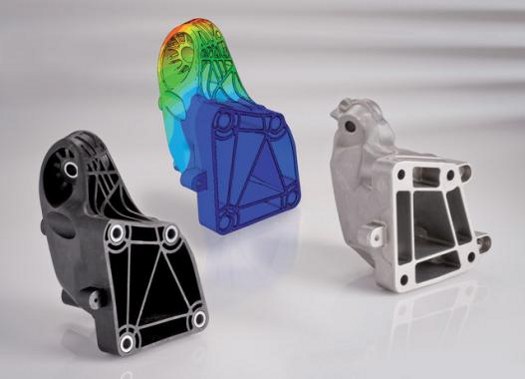 |
| April 23, 2013 | Volume 09 Issue 16 |
Designfax weekly eMagazine
Archives
Partners
Manufacturing Center
Product Spotlight
Modern Applications News
Metalworking Ideas For
Today's Job Shops
Tooling and Production
Strategies for large
metalworking plants
Wheels:
World's first plastic engine support makes debut in Mercedes GL
The six-cylinder diesel engine in the new GL Class Mercedes features an inconspicuous world first: a plastic engine support in place of an aluminum one.
Compared to the previous aluminum support, the plastic part reportedly offers improved acoustical properties, better thermal insulating characteristics, and a definite weight advantage, while being able to withstand the same load.

The world's first plastic engine support (left) being used by Daimler is not only 30 percent lighter and considerably quieter than its aluminum predecessor (right); it has a beneficial effect on the service life of the engine mounts. The part is used in the new Mercedes GL Class from Daimler and is molded from the polyamide specialty Ultramid A3WG10 CR from BASF. During the joint development of the component, the Ultrasim simulation tool and the design know-how of BASF plastics experts played an important role. [2013 Photo: BASF SE]
The part, which supports the engine with the aid of the engine mounts, is molded from Ultramid A3WG10 CR, a highly reinforced specialty polyamide from BASF that has been optimized for high mechanical loads. A company called Joma-Polytec in Bodelshausen, Germany, designed the injection mold and produced the plastic engine support.
Ultramid is no stranger to the engine compartment. The material is used in torque supports by various automakers. Torque supports, however, transmit only the tilting moment of the engine. In contrast, engine supports are subject to a permanent load (the engine's weight) while also absorbing the entire engine torque. To date, these parts have always been made from aluminum.
To replace aluminum in this challenging and crash-relevant application, the plastic must fulfill demanding mechanical requirements, including withstanding high bending moments. Ultramid A3WG10 CR, which is very rigid, is just the right material. It exhibits sufficiently low tendency to creep in the confined space of the engine compartment when subjected to a continuous load.
The good acoustic characteristics are the primary benefit of the Ultramid engine support over its aluminum counterpart. Thanks to the damping behavior specific to plastic, the new engine support also contributes to a more balanced sound.
An additional benefit is that the heat conduction of the plastic is considerably less than that of aluminum. As a consequence, the Ultramid engine support provides better protection from the engine's heat for the natural rubber engine mounts connected to it, increasing their service life. In the context of the CO2 discussion, a weight savings of over 30 percent for the plastic part versus the aluminum version is an additional plus.
Simulation for optimization of crash and acoustic behavior
The multitude of tests that the plastic part had to pass successfully included the so-called repair crash, which replicates smaller crashes, and the massive offset crash (offset head-on crash). In the first case, the support must remain undamaged; in the second case, it must fail quickly and in a specific manner to prevent the engine from entering the passenger compartment.
In addition to checking these requirements in crash tests, BASF already incorporated both cases into the very early development phase of the complex-shaped engine support by using of the company's own Ultrasim universal simulation tool, which predicted the part's behavior: ultimate (breaking) loads, strength values under dynamic pulsed loads, and crash loads agreed very well with the results of testing and achieved the values required for the aluminum predecessor. It was thus possible to incorporate ribbing to withstand the high loads and satisfy acoustic requirements early on and reduce the number of prototypes.
Source: BASF
Published April 2013
Rate this article
View our terms of use and privacy policy
